Sixties
City presents
a wide-ranging series of
articles on all aspects of the Sixties, penned by the creator of the iconic
60s music paper Mersey
Beat
|
Sixties
City presents
a wide-ranging series of
articles on all aspects of the Sixties, penned by the creator of the iconic
60s music paper Mersey
Beat
|
|||||
|
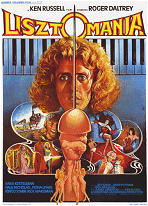 |
A
1975 film, 104 minutes in length, directed by Ken Russell and produced by
David Puttnam and Roy Baird. It was loosely based on 'Nelida' the memoirs
of Marie d'Agoult, which described her affair with the composer Franz Liszt
and also concentrates on the friendship between Liszt and composer Richard
Wagner, which deteriorated into almost open war. Made in the same year as
Russell's box office success with 'Tommy', the film is completely over-the-top,
surrealistic, nutty, absurd containing lots of nudity, phallic imagery and
Keystone type comedy and yet is utterly fascinating and has all the ingredients
of a cult movie, which is what it has become. Russell explained: "I was able to set up 'Lisztomania' by touting it as a film on a classical composer who was the Elton John of his day. No, I couldn't deliver Elton, but I could get Roger Daltrey, who starred in the title role of 'Tommy', and we all know how many millions that movie made. The fact that the treatment of the subject matter was symbolically and intellectually above the heads of the Daltrey fans was unfortunate, for the film was pure magic". Russell had begun his biographies of famous composers with his BBC documentaries on Elgar, Delius, Bartok, etc. and continued with his films 'The Music Lovers', based on the life of Tchaikovsky and 'Mahler'. However, he seems to have lost all restraint in his direction of 'Lisztomania'. Granted, Liszt was the first real pop star engendering mass hysteria at his concerts where women screamed and fainted in halls where there was standing room only - and 'Lisztomania' was actually a term coined by a contemporary, Heinrich Heine, but Russell seems almost to turn it into a type of 'Beatlemania', with Liszt's mistresses portrayed as groupies! |
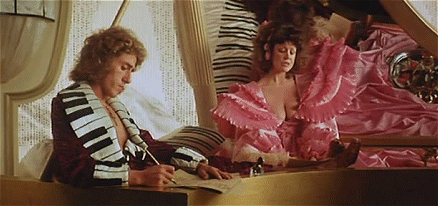 |
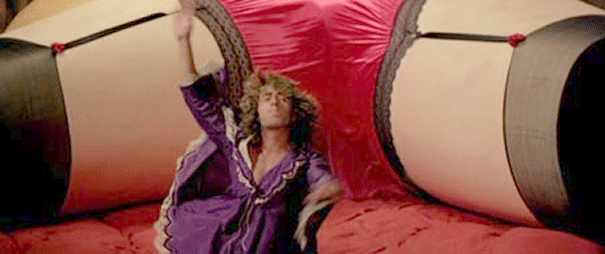 |
Flushed
with the success of 'Tommy', Russell once again cast Roger Daltrey in the
lead and has almost produced a rock opera of Liszt, although Daltrey is
relatively wooden, but likeable, in contrast to a credible performance as
Wagner by Paul Nicholas. Fiona Lewis appears as Marie d'Agoult in a sequence
in which her husband Count d'Agoult (John Justin), sporting a rapier, catches
her in bed with Liszt and a comic fight follows in which the Count chases
a half-naked Liszt around the huge bed chamber with a sword, to the soundtrack
music of a bluegrass banjo. The lovers are captured and locked inside a piano (the Count says that those that live by the piano must die by the piano) and placed in front of an approaching express train. Years later, they have three children but are unable to marry and Liszt recalls the early days of their affair in a brief scene dressed as Charlie Chaplin with Marie dressed like Chaplin's girlfriend. We see Liszt in his crowded dressing room before a concert, surrounded by his bodyguards and lots of groupies. Another composer, Richard Wagner, approaches him to ask him to buy the score of a new opera he's written about ancient Rome. Liszt then performs at a concert with hysterical girls screaming and fainting. When touring Russia he has an affair with a Russian princess, Carolyn (Sara Kestelman) of St Petersburg. He arrives at her castle and is rendered unconscious by gas emitted from ornamental bottoms on the wall. Oliver Reed appears in a brief sequence, showing Liszt into a room of the Palace. In the room the affair with the Princess is presented in a bizarre set piece with Liszt in a dress, singing, being pulled along by naked girls towards a guillotine which will cut off his swollen 15ft penis. Carolyn petitions the Pope for a divorce from her husband in order for her to marry Liszt, but the Pope (played by Ringo Starr with a Liverpool accent), refuses and Liszt is talked into becoming an Abbe, who has the same duties as a priest, but is not required to be celibate. The Pope also points out that Richard Wagner is stealing Liszt's music (we see Wagner as a vampire drawing blood from Liszt's neck as he plays a piano) and unless Liszt does something about it, his music will never be played in churches again. |
| In the
meantime Wagner has married Cosima (Veronica Quilligan), Liszt's daughter,
who abandons her first husband and daughter without gaining an annulment
from the church, straining the relationship between the two composers. The
film tumbles into the next century with Wagner portrayed as a Nazi and,
in the war between the composers, he sets a cryogenic Viking (Rick Wakeman,
the 'Yes' keyboardist who scored the film, depicted as the comic superhero
Thor) and robot Nazis with machine guns against Liszt. Complete mayhem ensues in the finale in which Wagner is killed by Liszt, but is re-born as Hitler and has a gun in his electric guitar with which he is killing Jews. Liszt, who has now died, returns from Heaven in an Inter-Continental Ballistic Missile and finally destroys Wagner in his Hitler guise. A soundtrack album 'Lisztomania' was issued in 1975, composed by Rick Wakeman. The tracks were: 1. Reinzi Chopsticks Fantasia, 2. Love's Dream, 3. Dante Period, 4. Orpheus Song, 5. Hell, 6. Hibernation, 7. Excelsior Song, 8, Master Race, 9. Rape, Pillage & Clap, 10. Funerailles, 11. Free Song, 12. Peace at Last. The music was performed by Rick Wakeman (keyboards), David Wilde (piano), George Michie, John Forsythe, The English Rock Ensemble and The National Philharmonic Orchestra. A critic was to comment at the time, "Perhaps Russell's most audacious piece of 'Lisztomania' casting is that of former Beatle Ringo Starr as the Pope. He visits Liszt (now an Abbe) in his monastic cell to tell him that Wagner has become possessed by the Prince of Darkness and orders Liszt to use his God-given musical powers to exorcise the devil in Wagner's soul". The film was premiered later that year on October 10th in New York and on November 13th in London. |
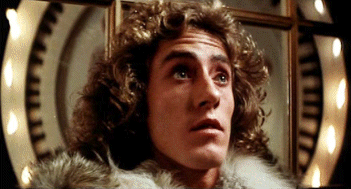 |
 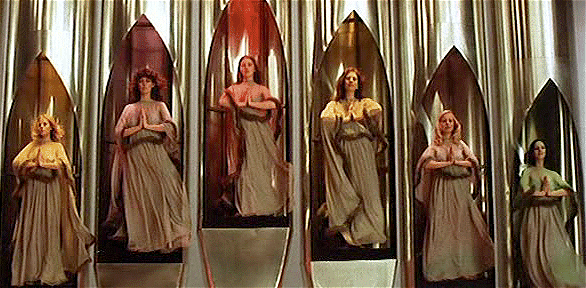 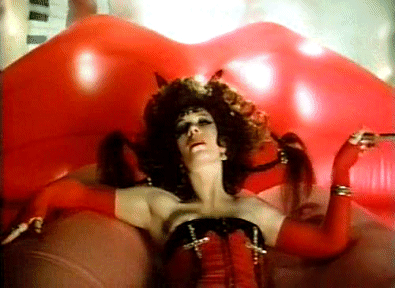 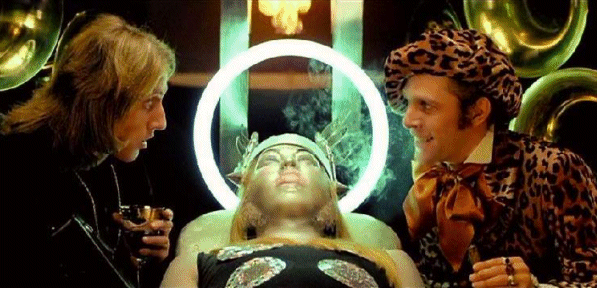 |
|
Article
Text
UK
web hosting by
|